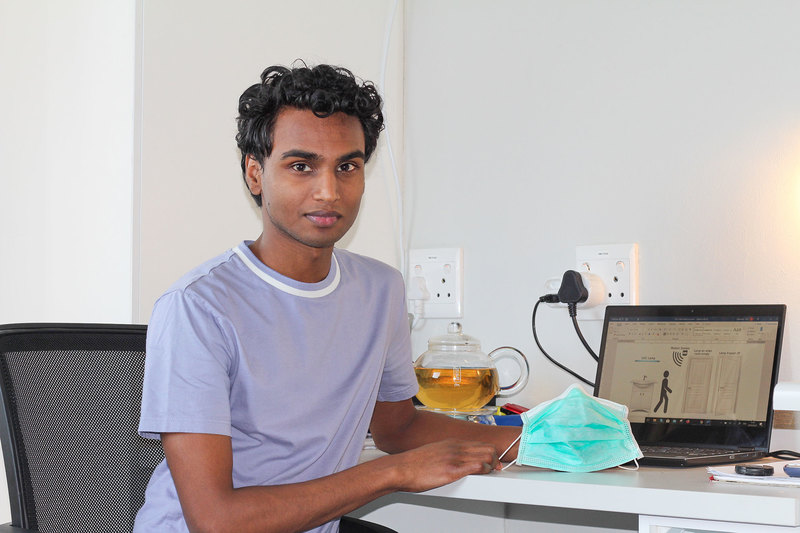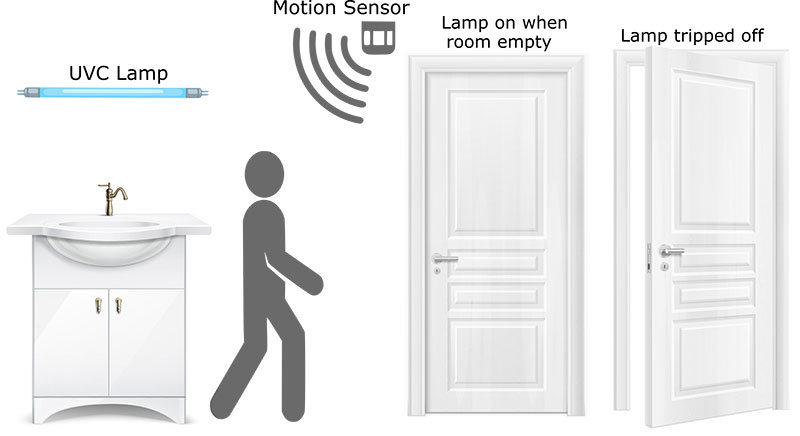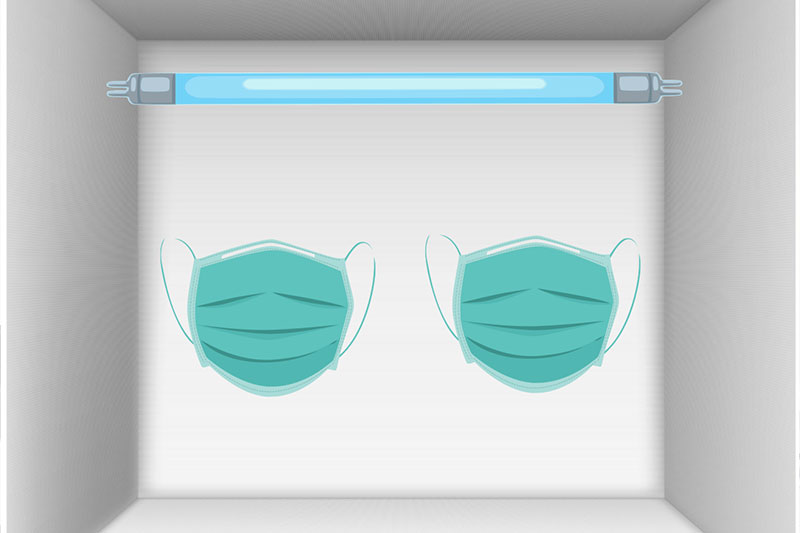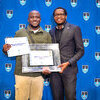Student’s smart UVC sanitiser has multi applications
11 May 2020 | Story Helen Swingler. Photos Supplied. Read time 7 min.
In response to Professor Amit Mishra’s challenge to engineering students to design devices to help counter COVID-19, University of Cape Town (UCT) electrical engineering student Rowyn Naidoo is close to finalising the design of an affordable, smart short-wavelength ultraviolet-C (UVC) light system that disinfects surfaces, the air and large rooms – and even face masks, making them reusable.
In taking up Mishra’s challenge, the UCT senior undergraduate student started by looking at his own campus: the now-empty classrooms, lecture halls and other large spaces, expanding on his long-held interest in science and technology.
“I took the route of how we can destroy or inactivate the actual viruses that are around on a large scale, with a view towards getting our campuses and similar spaces functioning normally, but safely,” said Naidoo.
UVC light is effective in killing other viruses and micro-organisms in and on our surroundings. It does this by destroying nucleic acids and disrupting their DNA.
Here Naidoo cites research by the IES Photobiology Committee in a freely available report on germicidal ultraviolet radiation (IES 2020). The report has been welcomed as “a counterpoint to information appearing in social media, the popular press, and in shady sales literature”.
The report states that the SARS-CoV-2 virus (the virus that causes COVID-19) can be rendered non-infectious with the application of UVC radiation because “it damages its RNA sequence, breaking its bonds in a way that stops its ability to replicate. Colloquially, it may be said that UVC radiation ‘kills’ the virus that causes COVID-19.”
Germicidal light
“UVC light also works on drug-resistant superbugs, fungi and bacteria, and disinfects in a matter of seconds or minutes – depending on the dosage,” Naidoo added.
It’s also not the same as the UV lights used in places like discos, he explained. UVC is light in the UV part of the spectrum, but at a higher frequency. It’s a more obscure part of the spectrum that emits shorter, more energetic wavelengths of light – and it can be dangerous to humans if they’re directly exposed to it.
“This project provides automatic, optimised disinfection on a much larger scale.”
While UVC light technology has been around for some time, Naidoo is taking this a step further by designing a simple and affordable smart sanitising system using UVC. The cost-effective design uses layers of aluminium foil and reuses materials for the outer structure.
“While there are some commercially available UVC disinfection products, this project will provide automatic, optimised disinfection on a much larger scale, such as entire rooms or lecture venues.

“I took the approach of how to actually kill the viruses while playing to my strengths as an electrical engineering student. I was aware of the use of UVC for this application and that it’s not in common use because of safety factors and cost. I then played around with these limitations towards a solution that is safe, feasible and cost-effective.”
Smart design
Naidoo ran his idea past two of his lecturers and is being mentored by Mishra as he finalises the design. It uses a combination of wall- or ceiling-installed lamps and occupancy detection sensors to determine if the room is vacant. It then automatically and safely switches on the UVC lights to irradiate the air and surfaces for the required amount of time, then automatically switches off for effective, economical disinfection.”

His design incorporates other safety precautions such as trip switches in the event someone opens the door to enter the room. This prevents their exposure to the harmful light.
“The light system requires no operational labour, which makes it easy to use and reduces the surfaces cleaning staff need to touch.”
It is emphasised that the efficacy of this light system is limited to areas in direct contact with the light.
Naidoo’s system will also disinfect the air, reducing the spread of airborne illnesses such as the common cold, influenza and tuberculosis.
“This is especially important in confined spaces with many people, such as lecture venues,” he noted. In this way, Naidoo envisages fewer disruptions to the academic programme when students and staff get sick.
“Practically, the lights can be used to disinfect lecture venues before and after each lecture, with similar applications to cinema theatres, classrooms, labs, toilets, etc.”
No more single-use masks
Another way Naidoo envisages his smart UVC system being used as a defence against COVID-19 is by disinfecting face masks.

“This will address the issue of insufficient face masks and is a more sustainable solution to simply producing more and more single-use masks.”
In collating the various ideas that have come from students in response to his challenge, Mishra said Naidoo’s design was one of the most interesting ideas that had come forward.
“With some minor help, Rowyn has improved the proposal substantially.”
It has put Naidoo’s initial early time in lockdown, before the university switched to online teaching, to good use too. But he misses the contact and vibe of campus.
“I’m in an off-campus accommodation in Cape Town. It’s been difficult to readjust and maintain focus, so I’ve been reminding myself of current deadlines, making my own deadlines and generally reminding myself of my goals,” he said.
“I’ve recently been encouraged by the quote ‘Don’t count the days, make the days count’ by Muhammad Ali, which is particularly relevant these days!”
 This work is licensed under a Creative Commons Attribution-NoDerivatives 4.0 International License.
This work is licensed under a Creative Commons Attribution-NoDerivatives 4.0 International License.
Please view the republishing articles page for more information.
UCT’s response to COVID-19
COVID-19 is a global pandemic that caused President Cyril Ramaphosa to declare a national disaster in South Africa on 15 March 2020 and to implement a national lockdown from 26 March 2020. UCT is taking the threat of infection in our university community extremely seriously, and this page will be updated with the latest COVID-19 information. Please note that the information on this page is subject to change depending on current lockdown regulations.
Minister of Health, Dr Joe Phaahla, has in June 2022 repealed some of South Africa’s remaining COVID-19 regulations: namely, sections 16A, 16B and 16C of the Regulations Relating to the Surveillance and the Control of Notifiable Medical Conditions under the National Health Act. We are now no longer required to wear masks or limit gatherings. Venue restrictions and checks for travellers coming into South Africa have now also been removed.
Read the latest document available on the UCT policies web page.
Campus communications
2022
UCT Community of Hope Vaccination Centre
On Wednesday, 20 July, staff from the University of Cape Town’s (UCT) Faculty of Health Sciences came together with representatives from the Western Cape Government at the UCT Community of Hope Vaccination Centre at Forest Hill Residence to acknowledge the centre’s significance in the fight against COVID-19 and to thank its staff for their contributions. The centre opened on 1 September 2021 with the aim of providing quality vaccination services to UCT staff, students and the nearby communities, as well as to create an opportunity for medical students from the Faculty of Health Sciences to gain practical public health skills. The vaccination centre ceased operations on Friday, 29 July 2022.
With the closure of the UCT Community of Hope Vaccination Centre, if you still require access to a COVID-19 vaccination site please visit the CovidComms SA website to find an alternative.
“After almost a year of operation, the University of Cape Town’s (UCT) Community of Hope Vaccination Centre, located at the Forest Hill residence complex in Mowbray, will close on Friday, 29 July 2022. I am extremely grateful and proud of all staff, students and everyone involved in this important project.”
– Vice-Chancellor Prof Mamokgethi PhakengWith the closure of the UCT Community of Hope Vaccination Centre, if you still require access to a COVID-19 vaccination site please visit the CovidComms SA website to find an alternative.
Frequently asked questions
Global Citizen Asks: Are COVID-19 Vaccines Safe & Effective?
UCT’s Institute of Infectious Disease and Molecular Medicine (IDM) collaborated with Global Citizen, speaking to trusted experts to dispel vaccine misinformation.
If you have further questions about the COVID-19 vaccine check out the FAQ produced by the Desmond Tutu Health Foundation (DTHF). The DTHF has developed a dedicated chat function where you can ask your vaccine-related questions on the bottom right hand corner of the website.
IDM YouTube channel | IDM website
“As a contact university, we look forward to readjusting our undergraduate and postgraduate programmes in 2023 as the COVID-19 regulations have been repealed.”
– Prof Harsha Kathard, Acting Deputy Vice-Chancellor: Teaching and Learning
We are continuing to monitor the situation and we will be updating the UCT community regularly – as and when there are further updates. If you are concerned or need more information, students can contact the Student Wellness Service on 021 650 5620 or 021 650 1271 (after hours), while staff can contact 021 650 5685.




















